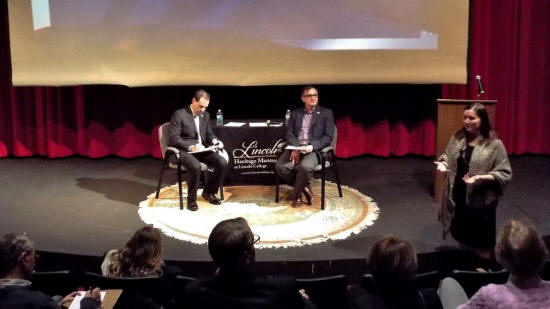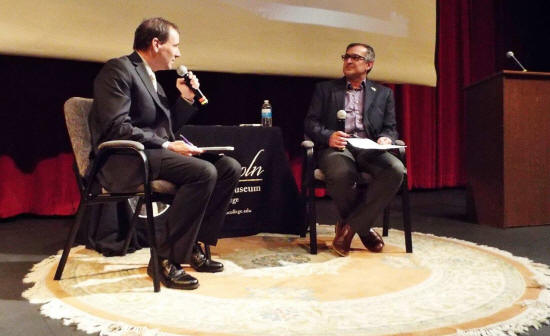|

Director of Lincoln Heritage Museum (LHM) Anne Moseley welcomed
guest speaker Dr. Marcelo Neito, PhD to the last lecture in a series
based on Abraham Lincoln’s character. Lincoln College was chartered
in 1865, the year of A. Lincoln’s last surviving birthday. “Our duty
is to continue to share the life, legacy and character of Lincoln
and the reason why this college was created in his name,” said
Moseley.
The evening's focus was on a different character trait of Lincoln,
'citizenship,' and how it can help influence us in the struggles of
today. Moseley said, “Citizenship within our community can be helped
by us voting and participating locally by volunteering. We encourage
more people to be part of the solution and not a part of the problem
or even complain about the problem because the only way to make our
states and communities better is by being an active participant.”

Abraham Lincoln Center for Character Development
Director Ron Keller moderated the question and answer session with
Dr. Marcelo Neito, PhD in chemistry. Dr. Neito is a U.S. naturalized
citizen from Cordoba, Argentina. He went through the process of
applying for United States Citizenship while pursuing his
postdoctoral studies at the School of Pharmacy at Ole Miss
(University of Mississippi). There, he lived with his wife and two
little boys in the year 2000.

In April of 2014, now a professor at Southern Illinois University -
Edwardsville, he received his citizenship. Dr. Neito offered a
unique perspective on what it means to be a United States citizen
and how it has affected him and his family’s lives.
“I pledge allegiance to the Flag …” All
immigrants must be sworn in by taking an oath to the American Flag
and their new country.
Ron Keller asked, “Having undergone immigration from Argentina, that
is a hot bed of political issues; every party has their perspective
on it. Should citizenship be made easier?”
Dr. Neito: “Citizenship varies. It is hard to get residency or a
valid visa for work. The process of becoming a citizen could be
harder. The citizen test is very simple. There is a big issue with
visa and illegal immigration.
"From my experience, I found that universities have an easier way to
get citizenship for scholars. I didn’t have any problems. It is most
difficult to handle those crossing the border. If an immigrant
works, they qualify to apply for citizenship.
"There should be a concerted effort to get citizenship with the
employer and employee for the immigrant to stay.”
“…of the United States of America…”
Lynn Spellman, Lincoln Heritage Museum volunteer asked, “Are your
sons automatically citizens?”
Dr. M Neito: “Yes. If you are under age 18 you are a citizen.”
“…and to the Republic for which it
stands,…”
Ron Keller asked, “You have been in the United States and you have
been a citizen now for 17 years. How do you see yourself? As an
American or Argentinean?”
Dr. Neito: “Both. It is hard for me to re-adapt. I already
re-adapted here. You see good and bad in both places. When me and my
family go back to our country, we see all the problems.”
“…one nation under God,…”
Spellman, asked, “Could you vote in Argentina now?”
Dr. Neito: “Only on the day of the elections. I am required to vote.
In Argentina there is no choice in whether you want to vote or not
vote. It is required.”
“…indivisible…”
Moseley asked about the election processes. "What are differences
between the two countries? Considering voter turnout, and citizens
thinking it is worthwhile to vote, do you see the benefits in
voting?”


Dr. Neito: “I have mixed feelings about Argentina’s requirement to
vote. Everyone should go and vote and not be forced—they should do
it anyway. Before I moved to this country, I didn’t pay attention to
voting. I am here now and I see the opportunity.
"One difference is I don’t like the campaigns. I don’t like what is
happening in the United States where opponents throw dirt at each
other over things that are not important. They don’t discuss the
real issues. There are too many parties.”
[to top of second column] |

“…with liberty…”
LC President David Gerlach, PhD asked, “Before coming to Lincoln College, I was
Vice President of a state school and at we decided to take the citizen’s test
they have online. I asked everybody (in his office) to take it. I was mortified!
I got 100, my assistant got a 95, and my chief financial officer got a 95.
"My younger staff really struggled and this was very disappointing to me and I
personally think everybody should have to take it. I find the ignorance in our
society remarkable. People have strong opinions but know very little about the
Citizen’s test.”
Dr. Neito: “I haven’t heard of anyone failing the test. They will ask questions
until you get a certain number of correct questions. But I have worked with
students of illiteracy and noticed that the U.S. doesn’t have an official
language…Puerto Rico is part of America and Spanish is the official language.
Why should we require everyone to know English? Most students agree. From taking
a course on immigration issues, I consider myself an Independent; not Republican
or Democrat. We all should be helping each other. We are one family.”
Dr. Neito’s passion is on education and making sure we keep the underserved and
at-risk children in school as well as advocating for higher education for all.
In this area he has worked within Southern Illinois University of Edwardsville,
(SIUE), organizing workshops targeting Hispanics and applied for grants to help
with the promotion and development of health specializations for bilingual
students, in particular Hispanics. He noticed that Hispanics have the lowest
education and the parents don’t help to teach them or send them to college. He
said there are a lot of scholarships at his pharmacy school for Hispanics but
not many take the opportunity and apply for them. He started working with his
church and the community and with people that he knows to make them aware that
they are open and you cannot use money as an excuse not to go to school.
Ron Keller asked, “What is it, from your perspective you most appreciate about
the United States? What should we as natural born citizens pay more attention
to?”
Dr. Neito: “I think what I appreciate here is that the United States is a well
organized country but we don’t care. When we have isolated incidents, we focus
too much on the negative. I have seen 10 or more good things. The society here
is also a different culture than that of Europe and Latin America and we learn
from their mistakes. We are forced to say things are ‘good’ when it is probably
not ok or not true.”
“…and justice for all.”
President Garlach asked, “Have you had any racism problems?”
Dr. Neito: “Never. I asked my kids if they had any problems with it and they had
no problem.”

President Garlach asked, “Have you travelled?”
Dr. Neito: “Yes, to Texas, Georgia, Alabama and Arkansas.”
President Garlach asked, “How much Spanish should a professional know? Is one
semester enough?”
Dr. Neito: “My school of Pharmacy teaches one year. We have had a lot of
students learning Spanish. There is a lot of American immigration to South
America and Buenos Aires, but mostly Europeans immigrate to Venezuela and
Bolivia when their country has a crisis.”
Ron Keller said, “Let us dare to do our duty.” He asked why do you think Abraham
Lincoln is a model citizen and what should we do more?
Dr. Neito: “President Lincoln was not afraid. He was very active and he
passionate. He served what is right.
"Be active and participate and do our duty. There are many ways to participate
and help do the right thing. Go vote and be active.”
As a chemist, Dr. Marcelo Neito’s areas of interest and expertise are synthetic
Medicinal Chemistry, natural products and analytical chemistry. He keeps an
active research lab with graduate students in the Masters in Pharmaceutical
Sciences programs as well as undergraduate students from SIUE. He actively
participates in many committees and service projects within the School of
Pharmacy and the university. Presently Dr. Neito is an active member of the St.
Boniface Catholic church through which he works in communities. He also
participates in a Hispanic committee of the Springfield Dioceses.
LHM Director Anne Moseley said there is more to just being a citizen, that is to
be ‘thankful’ for his/her freedom. You need to get out and use those freedoms
that people have sacrificed for.” She encourages people to be the solution and
make our states better by being an active participant. If immigrant Dr. Neito
can now choose to vote, so can you!
[Catherine Carkulis photos by Jan Youngquist]
Editors note:
This lecture took place just before the November election. The next opportunity
to vote is the Consolidated Election on Tuesday, April 2, 2019.
For volunteering opportunities contact a government leader or office, agencies,
schools, organizations, churches, senior living places, animal shelters. Just
open your eyes to what is around you that needs doing to make others lives
better or our green spaces more beautiful. |